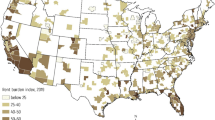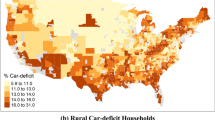Abstract
While happiness research in transportation is an emerging topic, this is the first study that uses the German SOEP 2003 data to study the role of peer effects in automobile access on self reported subjective well-being following the approach by Ferrer-i-Carbonell (2005). Defining peers based on age, education and location, we find that the peer’s average automobile availability has a statistically significant impact on quality of life, with stronger effects on persons without a vehicle than persons with vehicle access. Further results are that overall happiness can be locally increased with improving vehicle availability for people, however, that total happiness is maximized globally with a policy leading to nobody having access to an automobile. Finally, these results, which show that not having access to a car does not reduce well-being as long as the peers are in a similar situation, present some supporting evidence for the idea that automobile access can be seen as a “positional” externality and that the pathway for automobile access increasing happiness could be through the increased mobility options rather than through the actual activities made possible by the automobile.

Similar content being viewed by others
Notes
The value of the positive and negative peer’s deviation values could be interpreted as a variance.
The effect of children on happiness remains ambiguous in the literature. While some studies find a negative long- term influence (e.g. due to lack of leisure time, increasing conflicts between partners) (Clark et al. 2008; Clark and Georgellis 2013), Pollmann-Schult (2013) argues that the effect on life satisfaction is generally positive but varies depending on individual and family circumstances.
References
Abou-Zeid, M., Ben-Akiva, M.: The effect of social comparisons on commute well-being. Transp. Res. Part A 45, 345–361 (2011)
Abou-Zeid, M., Schmöcker, J.D., Belgiawan, P.F., Fujii, S.: Mass effects and mobility decisions. Transp. Lett.: Int. J. Transp. Res. 5(3), 115–130 (2013)
Bergstad, J.C., Gamble, A., Hagman, O., Polk, M., Gärling, T., Ettema, D., et al.: Subjective well-being related to satisfaction with daily travel. Transportation 38, 1–15 (2011)
Brock, W., Durlauf, S.: A multinomial choice model of neighborhood effects. Am. Econ. Rev. 92(2), 298–303 (2002)
Brock, W., Durlauf, S.: Discrete choice with social interactions. Rev. Econ. Stud. 66, 235–260 (2001)
Cao, X., Mokhtarian, P., Handy, S.: Cross-sectional and quasi-panel explorations of the connection between the built environment and auto ownership. Environ. Plan. A 39, 830–847 (2007)
Chen, C., Gong, H., Paaswell, R.: Role of the built environment on mode choice decisions: additional evidence on the impact of density. Transportation 35, 285–299 (2008)
Clark, A.E., et al.: Lags and leads in life satisfaction: a test of the baseline hypothesis. Econ. J. 118(529), 222–243 (2008)
Clark, A.E., Georgellis, Y.: Back to baseline in Britain: adaptation in the British Household Panel Survey. Economica 80(319), 496–512 (2013)
Delbosc, A.: The role of well-being in transport policy. Transp. Policy 23, 25–33 (2012)
De Vos, J., Schwanen, T., Van Acker, V., Witlox, F.: Travel and subjective well-being: a focus on findings, methods and future research needs. Transp. Rev. 33(4), 421–442 (2012)
Deutsches Institut für Wirtschaftsforschung DIW: Die Abgaben auf Kraftfahrzeuge in Europa im Jahr 2005, Berlin (2005)
Diener, E., Emmons, R.A., Larsen, R.J., Griffen, S.: The satisfaction with life scale. J. Personal. Assess. 49, 71–75 (1985)
Diener, E., Sandvik, E., Pavot, W.: Happiness is the frequency, not the intensity, of positive versus negative affect. In: Strack, F., Argyle, M., Schwarz, N. (eds.) Subjective Well-Being: An Interdisciplinary Perspective, pp. 119–139. Pergamon, New York (1991)
Diener, E., Inglehart, R., Tay, L.: Theory and validity of life satisfaction scales. Soc. Indic. Res. 112(3), 497–527 (2013)
Dugundji, E.R., Walker, J.L.: Discrete choice with social and spatial network interdependencies—an empirical example using mixed generalized extreme value models with field and panel effects. Transp. Res. Rec. 1921, 70–78 (2005)
EEA: Passenger Car Ownership in the EEA. European Environment Agency, Copenhagen (2012)
Ettema, D., Gärling, T., Olsson, L.E., Friman, M.: Out-of-home activities, daily travel, and subjective well-being. Transp. Res. Part A 44(9), 723–732 (2010)
Ferrer-i-Carbonell, A.: Income and well-being: an empirical analysis of the comparison income effect. J. Public Econ. 89, 997–1019 (2005)
Festinger, L.: A theory of social comparison processes. Hum. Relat. 7(2), 117–140 (1954)
Frank, R.: Positional externalities cause large and preventable welfare losses. Am. Econ. Rev. 95(2), 137–141 (2005)
Frank, R.: Should public policy respond to positional externalities? J. Public Econ. 92(8/9), 1777–1786 (2008)
Frey, B.S., Stutzer, A.: Stress that doesn’t pay: the commuting paradox. Scand. J. Econ. 110(2), 339–366 (2008)
Frey, B.S., Stutzer, A.: What can economists learn from happiness research? J. Econ. Lit. 40, 402–435 (2002)
Goetzke, F., Rave, T.: Bicycle use in Germany: explaining differences between municipalities with social network effects. Urban Stud. 48(2), 427–437 (2011)
Goetzke, F., Weinberger, R.: Separating contextual from endogenous effects in automobile ownership models. Environ. Plan. A 44, 1032–1046 (2012)
Goetzke, F: Network effects and spatial autoregression in mode choice models: three essays in urban transportation economics. Unpublished Dissertation West Virginia University Libraries (2006)
Goetzke, F.: Social network effects in public transit use: evidence from a spatially autoregressive mode choice model. Urban Stud. 45(2), 407–417 (2008)
Graham, C.: The Pursuit of Happiness: An Economy of Well-Being. Brookings, Washington, DC (2011)
Kahneman, D., Wakker, P.P., Sarin, R.: Back to Bentham? Explorations of experienced utility. Q. J. Econ. 112, 375–405 (1997)
Kahneman, D.: Experienced utility and objective happiness: a moment based approach. In: Kahneman, D., Tversky, A. (eds.) Choices, Values, and Frames, pp. 673–692. Cambridge University Press, New York (2000)
Kuhnimhof, T., Armoogum, J., Buehler, R., Dargay, J., Denstadli, J., Yamamoto, T.: Men shape a downward trend in car use among young adults—evidence from six industrialized countries. Transp. Rev. 32(6), 761–779 (2012a)
Kuhnimhof, T., Buehler, R., Kalinowska, D., Wirtz, M.: Travel trends for young adults in Germany: increasing multimodality and declining car use for men. Transp. Geogr. 24, 443–450 (2012b)
Luttmer, E.: Neighbors as negatives: relative earnings and well-being. Q. J. Econ. 120, 963–1002 (2005)
Manski, C.: Economic analysis of social interactions. J. Econ. Perspect. 14, 115–136 (2000)
Manski, C.F.: Identification of endogenous social effects: the reflection problem. Rev. Econ. Stud. 60, 531–542 (1993)
Nordbakke, S., Schwanen, T.: Wellbeing and mobility: a theoretical framework and literature review focusing on older people. Mobilities 9(1), 104–129 (2012)
Persky, J., Tam, M.-Y.: Local status and national social welfare. J. Reg. Sci. 30(2), 229–238 (1990)
Pollmann-Schult, M.: Elternschaft und Lebenszufriedenheit in Deutschland. Comp Popul. Stud.—Zeitschrift für Bevölkerungswissenschaft 38(1), 59–84 (2013)
Rasouli, S., Timmermans, H.: The effect of social adoption on the intention to purchase electric cars: a stated choice approach. In: Proceedings of the 92nd Annual Meeting of the Transportation Research Board, January 2013, Washington, DC (2013)
Ritter, N., Vance, C.: Do fewer people mean fewer cars? Population decline and car ownership in Germany. Transp. Res. Part A 50, 74–85 (2013)
Salon, D.: Neighborhoods, cars and commuting in New York city: a discrete choice approach. Transp. Res. Part A 43, 180–196 (2009)
Sandvik, E., Diener, E., Seidlitz, L.: Subjective well-being: the convergence and stability of self-report and non-self-report measures. J. Personal. 61(3), 317–342 (1993)
Simon, H.A.: Administrative Behavior. Free Press, New York (1976)
Sirgy, M.J.: The Psychology of Quality of Life. Social Indicators Research Series, vol. 50. Springer, Dordrecht (2012)
Stanley, J.K., Hensher, D.A., Stanley, J.R., Vella-Brodrick, D.: Mobility, social exclusion and well-being: exploring the links. Transp. Res. Part A 45(8), 789–801 (2011)
Stutzer, A., Frey, B.S.: Recent advances in the economics of individual subjective well-being. Soc. Res. 77(2), 679–714 (2010)
Terry, D.J., Hogg, M.H.: Group norms and the additude-bahvior relationship: a role for group identification. Pers. Soc. Psychol. Bull. 22(8), 776–93 (1996)
Walker, J.L., Ehlers, E., Banerjee, I., Dugundji, E.R.: Correcting for endogeneity in behavioral choice models with social influence variables. Transp. Res. Part A 45(4), 362–374 (2011)
Author information
Authors and Affiliations
Corresponding author
Rights and permissions
About this article
Cite this article
Goetzke, F., Rave, T. Automobile access, peer effects and happiness. Transportation 42, 791–805 (2015). https://doi.org/10.1007/s11116-015-9647-5
Published:
Issue Date:
DOI: https://doi.org/10.1007/s11116-015-9647-5




